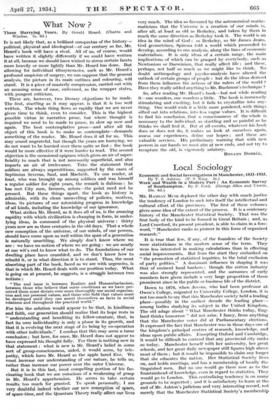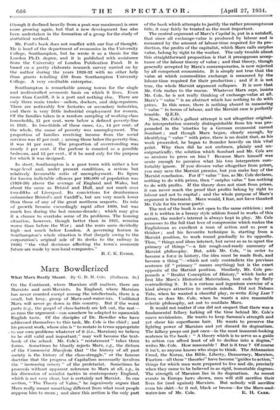Local Sociology
Economic and Social Investigations in Manchester, 1833-1933. By T. S. Ashton. (P. S. King. 5s.)
MR. RAMSAY MU•IR deplored the other day with much justice the tendency of London to suck into itself the intellectual and cultural effort of the provinces. The first of these volumes gives some idea of the extent of the process. It is a centenary history of the Manchester Statistical Society. That was the first body of the kind to be formed in Great Britain ; and, as Lord Crawford, its present president, is able to claim in a fore- word, " Manchester ranks as pioneer in this form of organized research."
It is true that few, if any, of the founders of the Society were statisticians in the modern sense of the term. They were less interested in making calculations than in effecting social improvements. But from the start they embarked on " the promotion of statistical inquiries, to the total exclusion of party politics." A dominant influence in shaping it was that of eminent local bankers ; though the cotton industry was also strongly represented, and the surnames of early members here given include a very large proportion of those prominent since in the public or business life of the district.
Down to 1876, when Jevons, who had been professor at Owen's College, migrated to University College, London, it is
not too much to say that this Manchester society held a leading place—possibly in the earliest decade the leading place— among bodies studying its subject in the United Kingdom. The old adage about " What Manchester thinks today, Eng- land thinks, tomorrow " did not arise, I fancy, from anything that the Manchester voter did at Parliamentary elections. It expressed the fact that Manchester was in those days one of the kingdom's principal centres of research, knowledge, and ideas upon public affairs. Excepting Oxford and Cambridge, it would be difficult to contend that any provincial city ranks so today. Manchester herself with her university, her great schools, and her great daily newspaper still figures high above most of them ; but it would be impossible to claim any longer that she educates the nation. Her Statistical Society lives on, and holds meetings, and has a membership of locally dis-
tinguished men. But no one would go there now as to the fountainhead of knowledge, even in regard to statistics. They
would go to London. This centralizing tendency is on many grounds to be regretted ; and it is satisfactory to learn at the end of Mr. Ashton's judicious and very interesting record, not merely that the Manchester Statistical. Society's membership
(though it declined heavily from a post-war maximum) is once more growing again, but that a new development has also been undertaken in the formation of a group for the study of statistical method.
Mr. Ford's book does not conflict with our line of thought. He is head of the department of economics in the University College, Southampton, but he wrote it as a thesis for the London Ph.D. degree, and it is published with assistance from the University of London Publication Fund. It is based on a pretty elaborate research survey carried on by the author during the years 1928-32 with no other help than grants totalling 150 from Southampton University College. A very creditable enterprise.
Southampton is remarkable among towns for the single and undiversified economic basis on which it lives. Even more than Cardiff, it is a port and nothing else. There are only three main trades—sailors, dockers, and ship-repairers. There are noticeably few factories or secondary industries, and there is very little industrial employment for women. Of the families taken in a random sampling of working-class households, 21 per cent. were below a defined poverty-line in 1931. In two-thirds of these cases, i.e., 14 per cent. of the whole, the cause of poverty was unemployment. The proportion of families receiving income from the social services was 47 per cent. ; among those below the poverty-line, it was 81 per cent. The proportion of overcrowding was nearly 5 per cent. if the parlour is counted as a possible bedroom, and 12 per cent., if it be used only for the purpose for which it was designed.
In short, Southampton is a poor town with rather a low wage-level and, under present conditions, a serious but relatively favourable ratio of unemployment. Its figure for known indictable offences per 100,000 of population was (1928-30) above the average of England and Wales, but about the same as Bristol and Hull, and not much over two-fifths of Liverpool. Its convictions for drunkenness Outnumber Bristol's and Cardiff's, but are Very much lower than those of any of the great northern seaports. Its rate of growth became exceedingly rapid after 1890, but was much less during the last eensus-decade ; which may give it a chance to overtake some of its problems. The housing situation, however, though better than in 1921, remains worse than before the War ; and the rents seem decidedly high—not much below London. A governing feature in Southampton's whole situation is that (largely owing to the corporation's original sale of its docks to the railway in 1836) " the vital decisions affecting the town's economic future are made by non-local companies."
R. C. K. ENSOR.













































 Previous page
Previous page